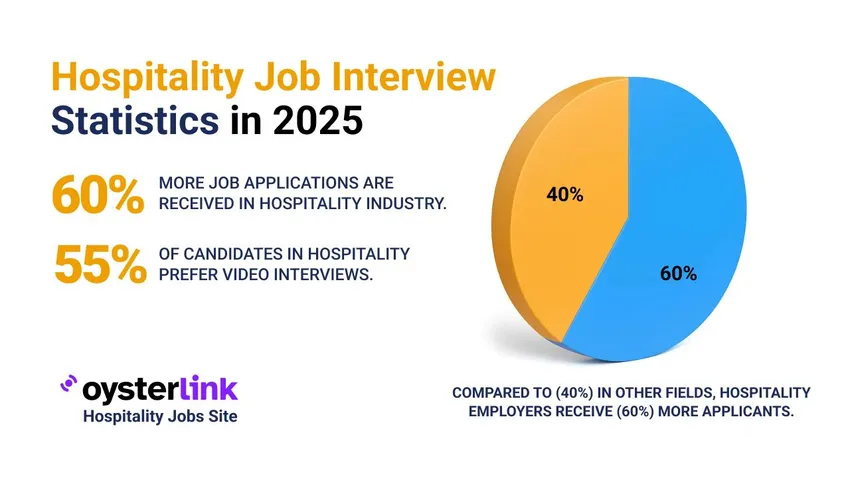Job interview statistics in hospitality offer valuable insight into the state of the industry.
They highlight slow hiring timelines, shifting candidate preferences, and the need for employers to refine their approach to attract top talent.
An Overview of Hospitality Hiring in 2025
Below are some of the most telling stats when it comes to recruitment and employment trends in the broader hospitality industry:
- As of March 2025, about 16.99 million people were working in the U.S. leisure and hospitality sector.
- The industry constantly encounters labor shortages, given that its annual turnover rate is 74%.
- This figure is nearly five times higher than the average 12% to 15% seen in other industries.
- On average, it takes about 20 days to fill a hospitality job vacancy, from when the position is posted to when someone is hired.
- However, this timing can vary widely, with some sources reporting a much shorter average of just 14 days.
- In the hospitality, entertainment and recreation industry, about 18% of interviews lead to a hire.
- That means, on average, only one out of every five people interviewed gets the job.
- The median age of the hospitality workforce is under 40, with millennials and Gen Z actively shaping hiring practices and workplace expectations.
- Hospitality employers receive 60% more job applications than the average for other industries, with around 117 people applying for each position.
- Approximately 70% of job seekers use mobile devices to explore opportunities.
- 55% of candidates prefer video interviews over in-person interviews.
- 57% of hospitality job seekers would be likely to drop out from the hiring process if employers do not meet their response times.
- 59% of organizations in the hospitality sector voluntarily include pay ranges in job postings.
- AI is expected to reduce time-to-hire by up to 11 days.
Hotel Hiring and Job Interview Statistics
Here are key insights and figures that influence recruitment specifically in hotels and resorts.
- About 65% of hotels report experiencing staffing shortages.
- U.S. hotels are projected to employ over 2.17 million people in 2025.
- The most commonly reported staffing shortages are in housekeeping, with 38% of employers citing difficulty filling these roles.
- Front desk positions follow at 26%, while culinary and maintenance roles are also challenging to fill.
- A survey revealed that 88% of job seekers expect to be interviewed within a week of applying.
- The most common strategy hotels use to attract and retain workers is offering higher wages, reported by 47% of hotels.
- Other strategies include offering flexible work hours (20%) and providing employee discounts on hotel stays (13%).
See also: US Hotel Industry Statistics for 2025
Restaurant Recruitment: Key Statistics and Trends
Below are key statistics that shed light on the current state of restaurant hiring and job interviews.
- On average, it takes about 18 days to fill a job vacancy in restaurants.
- In the restaurant industry, about 19% of job interviews result in a hire.
- The restaurant industry is projected to add 200,000 jobs in 2025, bringing total employment to 15.9 million by the end of the year.
- 70% of restaurant operators report having job openings that are difficult to fill.
- 45% state they don't have enough employees to meet customer demand.
- 37% of restaurant operators plan to adopt labor management and recruitment systems, while 28% are interested in AI-driven solutions.
- Limited-service restaurants have seen stronger job growth compared to full-service restaurants.
- Approximately 85% of restaurant management roles are filled through internal promotions.
See also: Restaurant Industry Statistics for 2025
Hospitality Industry Interview Process: Key Insights and Expectations
For hotel positions, interview questions often begin with prompts such as “Tell me about yourself” or “Why do you want to work here?”
Employers also commonly ask about a candidate’s strengths, weaknesses, and long-term career goals.
In the restaurant sector, interviews typically start with questions about previous restaurant experience and job expectations.
Since scheduling is especially important in this industry, candidates are often asked about their availability and flexibility.
Problem-solving ability, leadership potential, and teamwork are highly valued, as are attention to detail and providing excellent service.
Finally, cultural fit is a major factor in hiring.
Employers look for candidates whose values align with the company’s culture and who demonstrate enthusiasm for the hospitality industry.
The Candidate Experience: Insights and Feedback
In the hospitality industry, several key factors shape candidate satisfaction during interviews.
To begin with, clear and engaging job descriptions help set the right expectations from the start.
Lengthy or overly complicated procedures can discourage applicants, causing them to lose interest and explore other opportunities.
Interview quality also plays a critical role. Unprofessional conduct, irrelevant questions, or poorly structured interviews can harm a candidate’s impression of the company.
In a competitive labor market, employers who prioritize speed, professionalism, and clear communication are far more likely to secure top hospitality talent.
Final Thoughts: What This Means for Hospitality Job Interviews in 2025
The hospitality job interview process is shaped by high competition, evolving technology and changing candidate expectations.
For employers, this means investing in a streamlined, responsive hiring process to avoid losing top candidates.
For job seekers, understanding what hiring managers look for (such as communication skills, flexibility and cultural fit) can help improve interview outcomes.









Loading comments...